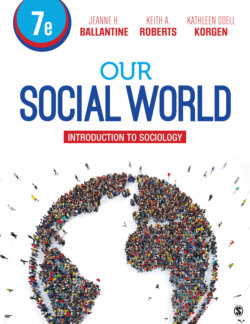Читать книгу Our Social World - Kathleen Odell Korgen - Страница 158
На сайте Литреса книга снята с продажи.
Development of the Self: Micro-Level Analysis
ОглавлениеHave you seen a young child, 3 years or under, using a tablet, smartphone, or other interactive device? Some research shows that the impact of mobile devices on preschool children can be detrimental to their social-emotional, sensorimotor, problem-solving, math and science, and reading skills. Preschool children who use such devices do not develop as much empathy as children who spend more time in social interaction during unstructured play with peers. Using mobile devices can also affect their ability for self-regulation of behavior and early literacy skills (Walters 2015).
On the other hand, educational television and mobile device programs can get parents reading to young children and help children who are closer to school age gain technological skills (Pearson 2018). Still, researchers suggest more direct human-to-human interaction, and designated “family time” is beneficial for young children’s socialization. Children under 30 months learn primarily from human interaction. We are talking here about the development of the self.
▲ This child is learning something about technology and no doubt receiving other messages through play. Besides how to work an electronic device, what other messages might this child be learning?
© iStock.com/quintanilla
A baby is born with the potential to develop a self, the main product of the socialization process. Fundamentally, self refers to the perceptions we have of who we are. This process starts at birth. Throughout the socialization process, our self develops largely from the way others respond to us—praising us, disciplining us, ignoring us, and so on. The development of the self allows individuals to interact with other people and to learn to function at each level of the social world.
Humans are not born with a sense of self. It develops gradually, beginning in infancy and continuing throughout adulthood as we interact with others. Individual biology, culture, and social experiences all play a part in shaping the self. The hereditary blueprint each person brings into the world provides broad biological outlines, including particular physical attributes, temperament, and a maturational schedule. Each person is also born into a family that lives within a particular culture, illustrating that nature is shaped by nurture. This hereditary blueprint, in interaction with family and culture, helps create each unique person, different from any other person yet sharing the types of interactions by which the self is formed.
Most sociologists, although not all, believe that we humans are distinct from other animals in our ability to develop a self and to be aware of ourselves as individuals or objects (Irvine 2004). Consider how we refer to ourselves in the first person—I am hungry, I feel foolish, I am having fun, and I am good at basketball. We have a conception of who we are, how we relate to others, and how we differ from and are separate from others in our abilities and limitations. We have an awareness of the characteristics, values, feelings, and attitudes that give us our unique sense of self (W. James [1890] 1934; G. Mead [1934] 1962).
Thinking Sociologically
Who are some of the people who have been most significant in shaping your self at different stages in your life? How have their actions and responses helped shape your self-concept as musically talented, athletic, intelligent, kind, assertive, clumsy, or any of the other hundreds of traits that might make up your self?
